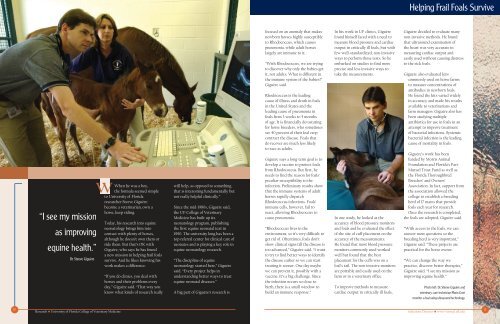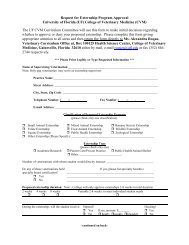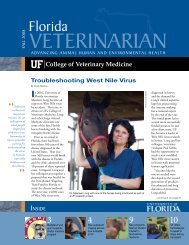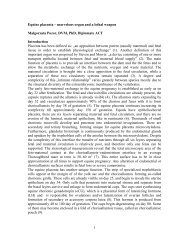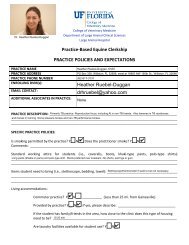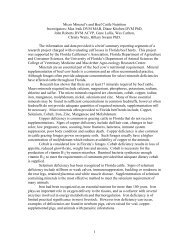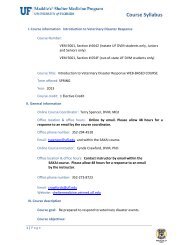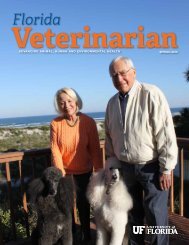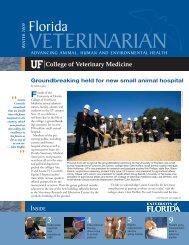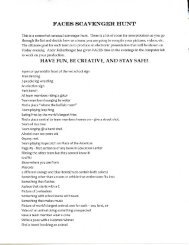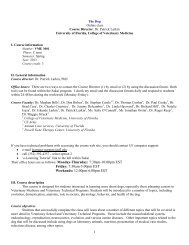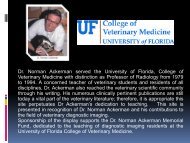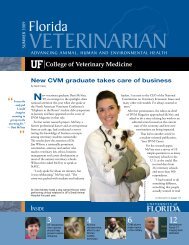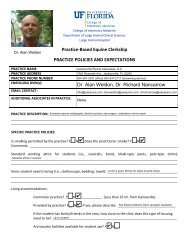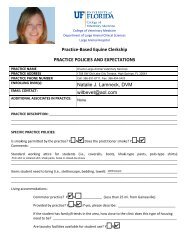College of Veterinary Medicine Research Brochure
College of Veterinary Medicine Research Brochure
College of Veterinary Medicine Research Brochure
- No tags were found...
You also want an ePaper? Increase the reach of your titles
YUMPU automatically turns print PDFs into web optimized ePapers that Google loves.
Helping Frail Foals Survive“I see my missionas improvingequine health.”Dr. Steeve GiguèreWWhen he was a boy,the formula seemed simpleto University <strong>of</strong> Floridaresearcher Steeve Giguère:become a veterinarian, own ahorse, keep riding.Today, his research into equineneonatology brings him intocontact with plenty <strong>of</strong> horses,although he doesn’t own them orride them. But that’s OK withGiguère, who says he has founda new mission in helping frail foalssurvive. And he likes knowing hiswork makes a difference.“If you do clinics, you deal withhorses and their problems everyday,” Giguère said. “That way youknow what kinds <strong>of</strong> research reallywill help, as opposed to somethingthat is interesting fundamentally butnot really helpful clinically.”Since the mid-1980s, Giguère said,the UF <strong>College</strong> <strong>of</strong> <strong>Veterinary</strong><strong>Medicine</strong> has built up itsneonatology program, publishingthe first equine neonatal text in1990. The university long has been atop referral center for clinical care <strong>of</strong>neonates and is playing a key role inequine neonatology research.“The discipline <strong>of</strong> equineneonatology started here,” Giguèresaid. “Every project helps inunderstanding better ways to treatequine neonatal diseases.”A big part <strong>of</strong> Giguère’s research isfocused on an anomaly that makesnewborn horses highly susceptibleto Rhodococcus, which causespneumonia, while adult horseslargely are immune to it.“With Rhodococcus, we are tryingto discover why only the babies getit, not adults. What is different inthe immune system <strong>of</strong> the babies?”Giguère said.Rhodococcus is the leadingcause <strong>of</strong> illness and death in foalsin the United States and theleading cause <strong>of</strong> pneumonia infoals from 3 weeks to 5 months<strong>of</strong> age. It is financially devastatingfor horse breeders, who sometimessee 40 percent <strong>of</strong> their foal cropcontract the disease. Foals thatdo recover are much less likelyto race as adults.Giguère says a long-term goal is todevelop a vaccine to protect foalsfrom Rhodococcus. But first, heneeds to find the reason for foals’peculiar susceptibility to theinfection. Preliminary results showthat the immune systems <strong>of</strong> adulthorses rapidly dispatchRhodococcus infections. Foals’immune cells, however, fail toreact, allowing Rhodococcus tocause pneumonia.“Rhodococcus lives in theenvironment, so it’s very difficult toget rid <strong>of</strong>. Oftentimes, foals don’tshow clinical signs till the disease istoo advanced,” Giguère said. “I wantto try to find better ways to identifythe disease earlier so we can starttreating it sooner. One day maybewe can prevent it, possibly with avaccine. It’s a big challenge. Sincethe infection occurs so close tobirth, there is a small window tobuild an immune response.”In his work in UF clinics, Giguèrefound himself faced with a need tomeasure blood pressure and cardiacoutput in critically ill foals, but withfew well-standardized, non-invasiveways to perform those tests. So heembarked on studies to find moreprecise and less invasive ways totake the measurements.In one study, he looked at theaccuracy <strong>of</strong> blood pressure monitorsand foals and he evaluated the effect<strong>of</strong> the site <strong>of</strong> cuff placement on theaccuracy <strong>of</strong> the measurements.He found that most blood pressuremonitors commonly used workedwell but found that the bestplacement for the cuffs was on afoal’s tail. The non-invasive monitorsare portable and easily used on thefarm or in a veterinary <strong>of</strong>fice.To improve methods to measurecardiac output in critically ill foals,Giguère decided to evaluate manynon-invasive methods. He foundthat ultrasound examination <strong>of</strong>the heart was very accurate inmeasuring cardiac output andeasily used without causing distressto the sick foals.Giguère also evaluated kitscommonly used on horse farmsto measure concentrations <strong>of</strong>antibodies in newborn foals.He found the kits varied widelyin accuracy and made his resultsavailable to veterinarians andfarm managers. Giguère also hasbeen studying multipleantibiotics for use in foals in anattempt to improve treatment<strong>of</strong> bacterial infections. Systemicbacterial infection is the leadingcause <strong>of</strong> mortality in foals.Giguère’s work has beenfunded by Morris AnimalFoundation and Florida’s Pari-Mutuel Trust Fund as well asthe Florida ThoroughbredBreeders’ and Owners’Association. In fact, support fromthe association allowed thecollege to establish a breedingherd <strong>of</strong> 17 mares that providefoals each year for research.Once the research is completed,the foals are adopted, Giguère said.“With access to the foals, we cananswer more questions so thebreeding herd is very important,”Giguère said. “These projects arepractical for the horse owner.“We can change the way wepractice, discover better therapies,”Giguère said. “I see my mission asimproving equine health.”Photo left: Dr. Steeve Giguère andveterinary care technician Maria Goremonitor a foal using ultrasound technology.10<strong>Research</strong> • University <strong>of</strong> Florida <strong>College</strong> <strong>of</strong> <strong>Veterinary</strong> <strong>Medicine</strong>••Infectious Diseases • www.vetmed.ufl.edu11


